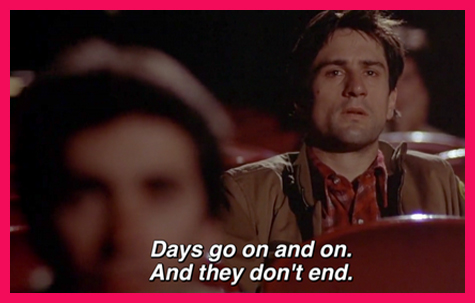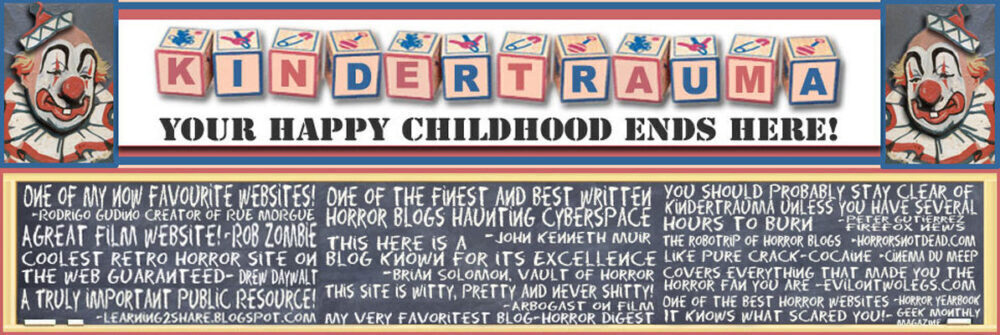
I don't know about anyone else, but I've been feeling extremely existentially depressed, hopeless and misanthropic lately-even more so than usual- as civilization collapses in real time all around us, but such is the nature of things- that's entropy for ya! That is something they tend not to show in all those futuristic "dystopian, post-Apocalyptic" films people seem to love; the spiritual and psychological damage inflicted upon those living through the collapse, it's always cyberpunk chic and Road Warrior fun and adventure. I thought I'd turn your attention to a few films which are more indicatory of the reality of the situation we face and in the tradition of the great pessimists like Oswald Spengler and Arthur Schopenhauer, dash your hopes and dreams of Thunderdome. I will skip a film like Taxi Driver, because everyone knows it and there's nothing, I can say about it that hasn't already been said, instead here are some under the radar films presaging the apocalypse.

Naked (1993) Before he lowered himself into the cesspool that is the Harry Potter film series, David Thewlis made a movie that matters. Johnny (David Thewlis) is smart and as such he is sickened by the state of affairs in the modern world, so he becomes a flawed lugubrious yet loquacious Jüngerian Anarch so as to deal with the spiritual and societal alienation and nausea an inwardly healthy person experiences in a time of general decay. This film portrays an apocalyptic world not of the Hollywoodized fun variety but one which is all too manifestly real if one has the courage to look. Naked proves one can be a devout atheist and realize hell is very real and it is all around us; which is infinitely more unsettling than a projected post mortem punishment.

Buddy Boy (1999) If David Lynch directed Rear Window, I think this would be the result. Life is not all sunshine and roses for Francis (Aidan Gillen), who intellectually lies at the opposite polarity as Johnny, but who still knows when it comes to existence, something is rotten in the state of Denmark. He has been subjected to unrelenting misfortune and brutality for no discernable reason, saddled with caring for an abusive, invalid mother (Susan Tyrrell) and now as a result of all the misery and pain he beholds, old Jehovah- once his only solace- has lost the sheen that once he had for him. He feels lost and hopeless and retreats into himself and away from the world, beginning to spy on a French neighbor, Gloria (Emmanuelle Seigner) he also seems to awaken his long dormant and hopelessly warped libido. Eventually Francis and his new crush meet and consummate a seemingly shared lust but as there are no such things as happy endings, what at first holds out hope for Francis soon proves to be his ruination and labefaction. When I first saw this film, Francis's plight hit home in more ways than one, I really can relate with existing on the margins of an uncaring, hostile society and world, not in a pretentious artist sort of way but on a visceral too close for comfort, every day to be or not to be sort of way.

Bartleby (2001) Ah work, doesn't everyone just love work? I mean we derive our raison d'être, our social standing, our sense of worth from what we do for money, don't we? Surely, we are economic beings as both our not so nearly antipodal Capitalist and Marxist overseers would have us believe, aren't we? What would we do with ourselves if we didn't have somewhere where someone was telling us what to do for reasons, we a.) don't understand and/or b.) couldn't care less about? Well I have to confess I don't love work; I don't care about work, I do not have a Protestant work ethic nor do I want one, I am not passionate about anything relating to money or what I do in order to acquire it. In short, when it comes to work, "I would prefer not to" and neither would Bartleby. Based on Herman Melville's "Bartleby, the Scrivener" Crispin Glover plays Bartleby, an odd fellow who may just have hit upon the answer to something profoundly wrong with modern people and their relationship to economic activity. I prefer this adaptation to the 1970 version as it suffuses more overt surrealism into the truly surreal, pointless nature of the work place.Â

Cop (1988) Â Oh boy, I like this one. Imagine if Dirty Harry fought really dirty; Lloyd Hopkins (James Woods) is an effective cop-imagine that- not a nice cop, not a kind cop, but an effective one. He goes after bad guys-and yes there are bad guys in the world-he is gleefully "reactionary", he isn't concerned with political correctness; only correctness. He loves women but realizes more often than not, that means saving themselves from themselves. He is the only thing standing between people who have lost the instinct for self-preservation and the violent predators who are looking for their next easy meal.
When an awful poetry spewing "male feminist" serial killer (Steven Lambert) with artiste pretentions begins preying on the women of the urban hell of Los Angeles, leaving a trail of mutilation in his wake, whether they know it or not or like it or not, Lloyd Hopkins is the kind of cop- the kind of man- women need on their side, the kind which his worthless Chief (Raymond J. Barry) derisively describes as having "a wild hair up your ass for murdered women". Hopkins is exactly the sort of cop who would be crucified in today's climate precisely because he uncompromisingly does what is necessary to enact justice.

He is probably the most culturally pessimistic police officer in the history of cinema who sees the social decay of a society unraveling at lightning speed up close and personal on a daily basis and doesn't hesitate to deliver a healthy dose of masculine cold water to the feminized airy fantasy worlds that people in this society seem to construct for themselves in the form of violent police stories told to his adolescent daughter (Vicki Wauchope). Predictably his wife (Jan McGill) is none too pleased with this, and calls him "a very sick man…in need of some real help." to which he responds with what I feel is one of the most profound statements in a movie and which bears quoting at length for all to meditate upon: "Let me tell you something you should get through your head. They're all little girls, Jen. Every one of them. Every one of those pathetic souls who eventually does herself in is a little girl. Every neurotic who lies on a couch…and pays some asshole shrink good money to listen to her bullshit is a little girl. Every hooker out hustling her ass for a pimp…who winds up with a dyke, a habit, or wasted by some psychopath, is a little girl. All these little girls have one thing in common. You know what that is? Disillusionment. And it always comes from the same thing, expectations. The greatest woman-killer of all time. A terminal disease that starts way back when they're all just little girls. When they're being fed all the bullshit…about being entitled to happiness like it's a birthright. That's what you don't understand…when to stop perpetuating the myths that ruin their lives. Innocence kills, Jen. Believe me. It kills. I see it every fucking day of my life."

Not liking that his wife up and leaves him, taking his daughter with her. He does not fret though but instead pursues other women including a prostitute witness who later winds up falling victim to the wannabe poet serial killer and a feminist book dealer cum poet (Lesley Ann Warren) dealing in more than just books in the form of post-rape PTSD which may or may not have set off the aforementioned serial killer. The film concludes with a showdown between the "romantic poet" beta male serial killer and the alpha male "misogynist" cop and one of the most satisfyingly abrupt endings of any film I can recall. This one feels timely because, given the state of affairs in this country, it seems we as a civilization have failed to heed its warning to our detriment.Â

Ringing Bell (1978) A children's cartoon about a little lamb named Chirin, with an important message about survival in a pitiless world for all of us weaklings who grew up with sugar coated claptrap about kindness and friendliness and pacifism being virtues. This is the film Lloyd Hopkins would show his daughter.


Ghastly1!
Thanks for these compelling picks and this cathartic read! I have a feeling that I could not deal with THE RINGING BELL at all right now. those dead baby birds are too much for me. That (and the quote from COP) made me think of this one moment in THE LONG KISS GOODNIGHT when Geena Davis’ daughter falls on the ice and cries and she grabs her kid and says “Life is pain. Get used to it!" Very disturbing and yet no lies detected.
Really appreciate you schooling me on COP – I always avoided that movie because I figured it was just a standard action flick and I’m not much of a Woods fan but if its got that sleazy LA element and Lesley Anne Warren I’ll give it a shot.
Great to see two of my favorites, Susan Tyrrell and Christen Glover mentioned here. BARTLEBY is a real gem- such an incredible use of color and I love Glenne Headly and the “I’d prefer not to†song! NAKED is a bold movie especially surprising coming from Mike Leigh- not sure I can deal with the heaviness right now though- I’m hiding in old episodes of THE X-FILES currently!
Really appreciate this post and you’re not alone in that feeling of unease and dread about the state of things! Disillusionment really is the worst.
Cop is a great movie; it's definitely got some action, but it's not some mindless stereotypical action movie with nothing but shootouts and explosions (although, I love those movies as well), it's got some comedy, it's got drama,but most of all-and this is what gives it more depth than one might initially realize and what sets it apart from other "cop movies"- it's got a pretty strong undercurrent of cultural pessimism. That won't make it popular with the "everything's fine" mindless optimism crowd, but then who cares about them anyway? it's their fault for being wrong.
Ringing Bell is a fantastic antidote to the maudlin sentimentality of Disney. Had us grown ups had a little of it when we were kids, maybe the world wouldn't be in the state it's in at present. I love the wolf.
Naked stands as one of the great pessimist works of art. Johnny doesn't hold back and tells it like it is.
The one that I feel really fell under the radar is Buddy Boy. I don't hear many people talking about that one at all and it's a shame because I feel it is right up there in really capturing the feeling of profound spiritual and social alienation with the likes of Taxi Driver and Diary of a Country Priest.
Bartleby as movie definitely has it's funny moments but his character is very much real and the subtle hints to his backstory shown in brief glimpses of family photos make him another manifestation of almost sublime alienation.
I know I have experienced the sorts of things these fictional characters have, which means they are coming from a very real place, they are real in the sense that matters.